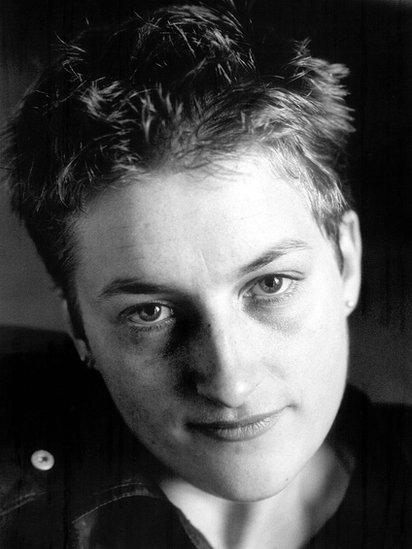Sarah Kane 'vindicated' by National Theatre debut
- Published

Cleansed, Kane's third play, opened at the National Theatre this week
This week, Sarah Kane received the ultimate accolade for a playwright - having one of her plays open at the National Theatre for the first time.
Tragically, the revival of her 1998 play Cleansed comes 17 years to the month after her suicide, at the age of 28.
Since her death in 1999, Kane has become one of the most acclaimed writers for theatre in the English language. Her plays have been staged in more than 50 countries, from Argentina to Armenia, Montenegro to Mexico.
"There's a growing interest in her work from the US," says Graham Saunders, professor of theatre at Birmingham University and author of a Kane biography (Love Me or Kill Me: Sarah Kane and the Theatre of Extremes).
"4:48 Psychosis [her fifth and final play] is on the A-Level drama syllabus. You'd be hard pushed to find any British drama course in English that doesn't cover Sarah Kane."
Kane's initial experiences of university drama came at Bristol, where she was a contemporary of David Walliams and acted in a student production of Howard Barker's Victory, alongside Simon Pegg.
Her first authored play, Blasted, caused a stir at the Royal Court in 1995. Its references to rape, torture, drug use and child abuse led to condemnation, the Daily Mail calling it "a disgusting feast of filth".
Cue front page headlines, news reporters outside the playwright's house and a discussion on Newsnight.

Cleansed features various characters being tortured by a doctor on stage
"It never crossed my mind it was going to cause a scandal," reflects journalist and author David Benedict, who conducted the first newspaper interview with Kane at the height of the 1995 controversy.
"It was in a 69-seat theatre [the Royal Court Upstairs] and a play addressing violence against women was never going to be an easy watch."
Mel Kenyon, the playwright's agent and friend, says the negative reaction to her work hit Kane hard. "She was only 24 years old. She effectively withdrew from things."
Simon Stephens, who won Olivier and Tony awards for his stage adaptation of The Curious Incident of the Dog in the Night-Time, happily credits Kane's writing as a catalyst for his own.
"I read Blasted and Edward Bond's Saved in one day. I physically remember not being able to move afterwards. It changed everything.
"Idiots might have reacted to [Blasted] but it's a complete masterpiece. It's not an accident of youthful spirit, it's meticulously structured."

Sarah Kane died in 1999 at the age of 28
Blasted was followed by four plays - Phaedra's Love, Cleansed, Crave and 4:48 Psychosis - and Skin, a short film for Channel 4.
Ewen Bremner, who had just played Spud in Trainspotting, took the lead role in 1997's Skin and found Kane had not diluted her subject material for the small screen.
"It was about a sado-masochistic love affair between an ignorant racist skinhead and his powerful, black, beautiful next door neighbour. So not exactly subtle, but it was full of humour and love.
"Around the same time Sarah moved into the flat next door to me, and we were friends and neighbours until she died."
Bremner, Kenyon and Benedict attest to Kane's inner calmness and a romanticism at odds with the uncompromising nature of her plays. (Bremner calls her "a genteel, anarchist Princess Diana".)
Simon Stephens agrees. "What you notice when you sit and read the plays in one go is that there are unifying themes. It illuminates her interest in how romantic a place the world can be.
'Searching to articulate'
"That can lead to disappointment, but she was searching to articulate the astonishing nature of life. And whenever things are getting a bit dark, she drops in a great dirty joke."
Kenyon puts it another way. "At her memorial, Harold Pinter, who loved Sarah, said it was like she was missing a layer of skin."
4:48 Psychosis, named after the time in the morning when the depths of her depression felt keenest, was completed shortly before her suicide at King's College Hospital, south London. It continues to be a source of speculation.
"You can see 4:48 Psychosis as a statement on mental health issues in the NHS, or it could be a play about transgender people, or it could be a play about an individual person," says Professor Saunders.
Bremner took part in a reading before it was staged. "I didn't realise at the time how deeply it portrayed her own interior state and struggle. She kept it well hidden."

Previews of Cleansed have seen both faintings and walk-outs
Memories of Kane's two suicide attempts remain fresh for Kenyon. "I remember going to see her in hospital on the Thursday with some fags and we had a good chat.
"She did say 'I will do it again, you know' and I thought she meant when she was about 40. She died the following weekend.
"In hindsight, it wasn't surprising. She was lovely and calm when I saw her. I now know that calmness came from the fact she had made up her mind."
'Emotional courage'
Even though Kane was fascinated by Joy Division, whose lead singer, Ian Curtis, took his own life at 23, friends and admirers are keen for audiences to view the plays on their own terms.
"She articulated what she'd done in 4:48 Psychosis. but it takes emotional courage to keep writing, especially a great play," argues Kenyon. "I don't want to diminish the writers who continue to do that."
Stephens is equally adamant that her work should be analysed on its own terms, not in relation to her own tragic story.
"You're barking up the wrong tree if you look at the plays in that way," he says.
"It's probably an attempt to make sense of something as unthinkable as an early death, but Sarah Kane's plays are brilliant because Sarah Kane's plays are brilliant."
Cleansed runs at the National's Dorfman Theatre until 5 May.